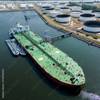Overhaul Of U.S. Natural Gas Export Review Process
The Obama administration on Thursday announced a major overhaul of its review process for U.S. liquefied natural gas exports, a change that would benefit companies with strong financial backing for their projects.
Under the proposal, the Department of Energy would no longer issue conditional approvals of projects.
Instead, the department would decide whether an LNG export project is in the national interest only after the Federal Energy Regulatory Commission, or another agency, had issued a final environmental review.
The action would shift emphasis from the department's conditional approval, placing the onus on FERC.
The department said that by waiting until the environmental review is completed, it could better determine the viability of a project, because the FERC process costs far more than the department's application process.
Companies pay up to $100 million to complete the FERC process, a significant investment that separates serious projects from those that may not have financial means to actually construct multibillion-dollar export facilities.
An Energy Department export application costs about $20,000 to file.
"DOE will also be better positioned to judge the cumulative market impacts of its authorizations in its public interest review," Christopher Smith, deputy assistant secretary for fossil energy, said in a statement.
"It changes the risk profile of every project that's out there that hasn't received an export authorization," said Steve Martin, vice president of finance and contracts for Louisiana LNG Energy.
"Some of the project financing requires an offtake commitment, and an offtake commitment is somewhat dependent upon being able to take it somewhere, so for final investment decisions, there could be some impact." His company currently is seeking an offtake contract, Martin said. A final investment decision is not in place yet.
An offtake contract is a would-be buyer's commitment to purchase a project's LNG.
The administration has been under pressure from backers of LNG exports, including many Republican lawmakers and some Democrats from oil and gas states, to streamline the approval process for LNG projects.
While the Department of Energy decides whether proposed LNG exports to countries lacking a free-trade agreement with the United States are in the public interest, FERC weighs the safety and environmental impact of the export facilities.
Until now, the administration set up its queue mostly based on when applications were filed with the department, with some priority given to project backers that had filed with FERC.
The proposed changes will likely not have too much impact on the two projects at the front of the old queue.
The public will have 45 days to comment on the DOE's plan. During that time the department will continue to review projects under its existing process, making it likely that the next application up for review, Leucadia National Corp's Oregon LNG project, could snare a conditional approval.
Cheniere's Corpus Christi project is next in line, but it is also far along in its review process at FERC. If the administration's plan is adopted, the project is likely to be one of the first approved under the new procedures.
Gas industry groups that have pressed the department to speed up its process were cautiously optimistic about the plan but also raised concerns.
If the DOE is allowed to alter the process at any time, those projects that benefit from these changes may be put at a disadvantage later on, said Bill Cooper, head of the Center for Liquefied Natural Gas.
"We just don't have any regulatory certainty about the process. It keeps changing," he said.
The department said it also plans to undertake additional studies of the economic impact of U.S. LNG exports of between 12 billion and 20 billion cubic feet a day.
The application review process would continue while these studies are conducted, the DOE said.
By Ayesha Rascoe












